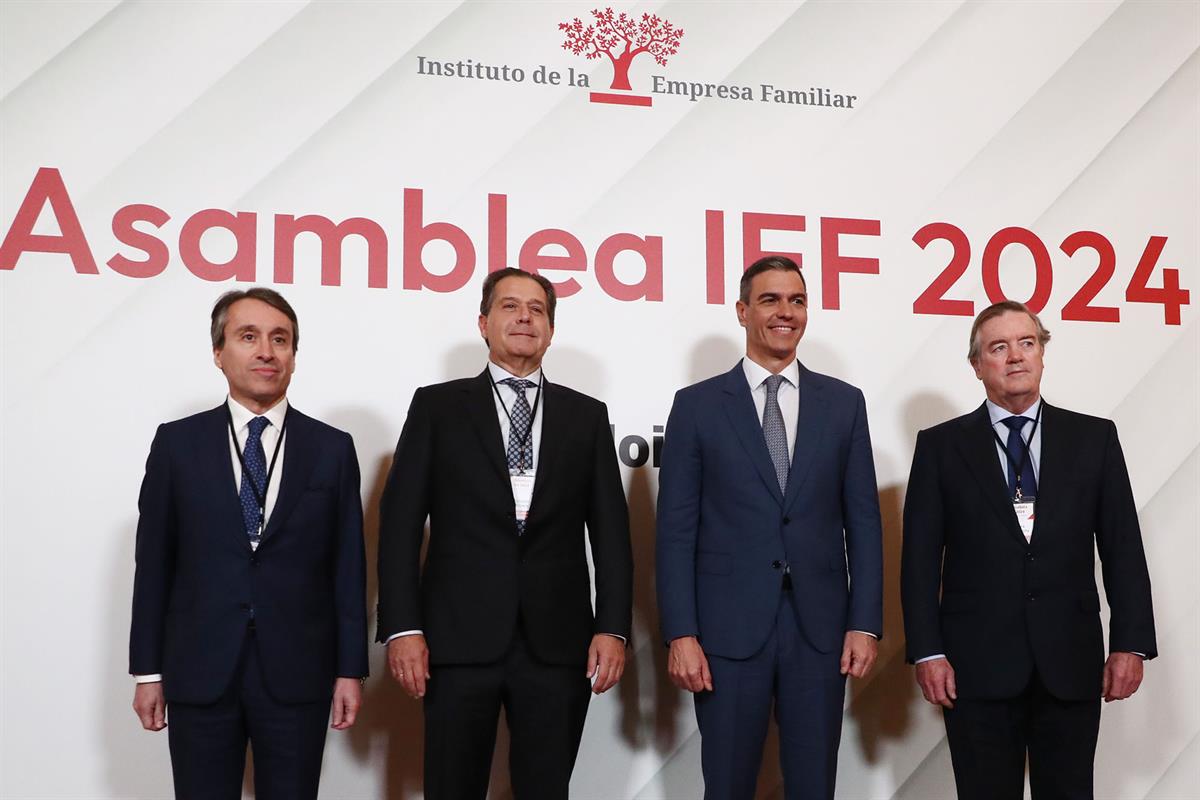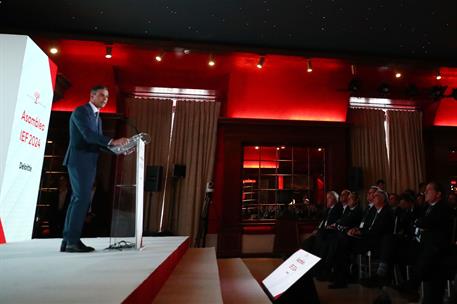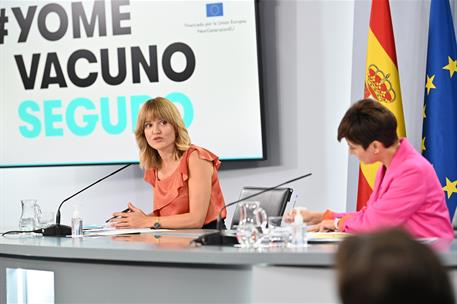Closing of the Annual Assembly of the Instituto de la Empresa Familiar (IEF)
The President of the Government of Spain calls on companies to invest and improve working conditions and wages for workers
President's News - 2024.5.8
Images of the closing of the Annual Assembly of the Family Business Institute | Pool Moncloa/Diego del Monte - 2024.5.8
Royal Theatre, Madrid
During his speech at the event, Pedro Sánchez stressed that companies are "essential for the growth and well-being of a country" as they generate "employment, innovation and opportunities" and, therefore, he asked them to get involved in order to sustain the current welfare state model and "continue to increase the purchasing power of workers; to contribute to curbing the climate crisis; and also to defend our democracy as the only system that is capable of combining social justice, civil liberties and economic growth".
Pedro Sánchez defended the "virtuous circle" of social peace and stability in Spain, together with the commitment to coexistence and useful politics and the "shared will to look forwards in order to build", after highlighting the social responsibility practised by family businesses, which are the "backbone of the business fabric", representing nine out of every ten companies in Spain.
Better wages, more investment in training and more flexible working hours
The head of the Executive encouraged them to invest more in training workers, particularly in digital skills to close the gap with the EU average and in advanced technologies such as the 'cloud' or Artificial Intelligence, as well as to invest in R&D and continue opening new markets, inside and outside the European Union.
After the "great steps taken in recent years, much remains to be done", said Pedro Sánchez, who called for "paying better salaries, strengthening training, making working hours more flexible and making work a healthier and more satisfying experience". "Help us to make people's lives better," he said.
At the same time, he advocated "using current profits to invest in productivity gains and our future competitiveness", as well as "rewarding investors and shareholders fairly, but also modernising and strengthening the foundations of our productive fabric and our society".
A Government "ally" of business
 The President of the Government of Spain, Pedro Sánchez, along with other attendees at the closing of the Annual Assembly of the Family Business Institute | Pool Moncloa/Fernando Calvo
The President of the Government of Spain, Pedro Sánchez, along with other attendees at the closing of the Annual Assembly of the Family Business Institute | Pool Moncloa/Fernando Calvo
"The Government will recognise this effort and will help you as much as it can", said Pedro Sánchez, who stressed the need for a "strong" state and a "prosperous and fair" private sector and market that generates wealth in a distributed manner. In this sense, he assured that the Executive will be an "ally" of companies that want to be more competitive through innovation and talent.
In line with the support offered to companies in recent years, Pedro Sánchez has indicated that the Government will continue to support companies with reforms and laws in the "right direction", such as the already approved Startups Act, the Crea y Crece Act and the Vocational Training Act. In turn, he urged progress in environmental sustainability and labour dignity and a commitment to training in human capital to face challenges such as those posed by digitalisation and disruptive technologies such as Artificial Intelligence, thanking the Instituto de Empresa Familiar for its defence of "a business model based on people".
The decisive role of the family business in economic performance
The leader of the Executive thanked them for their contribution to social and territorial cohesion and that of the entire business fabric to making the economy more "robust". The role of family businesses, he said, is "decisive" in the "great performance" of the Spanish economy, contributing to the fact that Spain is creating four out of every ten new jobs in the entire European Union and achieving the record of more than 15 million workers with permanent contracts and more than 11.5 million households with all their members in work.
He cited some of the latest known indicators, such as the recovery by 2023 of Spanish households to their income levels prior to the financial crisis due to the increase in real income of 5.2% per inhabitant, according to the OECD; the consolidation of the record 21 million national insurance contributors; the creation of more than half a million new jobs in the last year; the record number of women registered; the increase in youth employment by 15 points since the pre-pandemic figures; and the reduction in the number of unemployed to its lowest level in 15 years.
He also stressed that stability allowed the Spanish economy to grow by 2.5% in 2023 and 0.7% in the first quarter of the year, and makes Spain an attractive destination for investment, being the most open to foreign direct investment among the large countries of the European Union, according to the OECD, ahead of Germany, France and Italy. "It boosts business confidence and stimulates private consumption and investment, among other reasons, thanks to the recovery of real wages," he added.
Structural strengthening of the economy: "reasons to be optimistic".
The president of the Government of Spain has welcomed the fact that all national and international organisations certify the "structural strengthening" of the Spanish economy, "increasingly less exposed to external shocks", and predict that Spain will continue to grow above the European average and the most developed economies, despite the uncertainty and the difficult geopolitical context. According to the Bank of Spain, the International Monetary Fund and the European Commission, the growth of the Spanish economy will more than double the average growth rate of the eurozone. "We are a great country and there are great reasons to be optimistic about the future of our country. It is very important to underline the role of family businesses, the productive fabric and the workers in this optimism for the future that lies ahead of us", he added.
In addition to these forecasts, there is the simultaneous growth in employment and productivity, an "unprecedented" figure in the last 30 years; the 50% increase in employment in sectors such as IT, R&D and scientific and technical professions since 2018 or the 56% increase in exports of non-tourist services, such as engineering, consultancy or auditing in the last six years, which already surpasses tourism in terms of revenues.
Despite the progress made in the dual green and digital transition, Pedro Sánchez pointed out that "much remains to be done" and called for business collaboration to reduce structural unemployment by strengthening the employability of workers and improving the functioning of public employment services, in order to match the demand for new job profiles with the necessary retraining and training. The president of the Government of Spain also acknowledged the work carried out by the outgoing president of the IEF, Andrés Sendagorta, and congratulated the new president, Ignacio Rivera.
Non official translation






